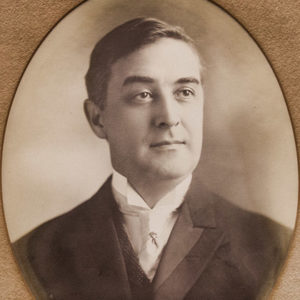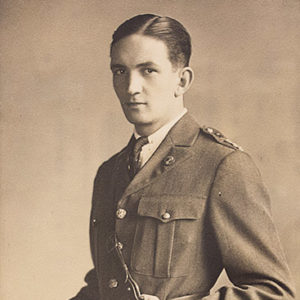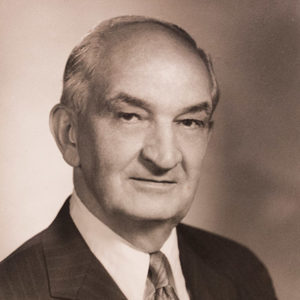calsfoundation@cals.org
William Starr (Will) Mitchell (1907–1981)
William Starr Mitchell was a distinguished Arkansas lawyer who emerged as a leader in 1959 during the crisis involving the desegregation of Little Rock Central High School and the subsequent closing of the city’s schools, serving as campaign manager for Stop This Outrageous Purge (STOP). Mitchell was long remembered for his television appearance in the midst of a recall election aimed at ousting segregationists from the school board when he told Governor Orval Faubus: “Governor, leave us alone! Let us return our community to a rule of reason.”
Will Mitchell was born on June 5, 1907, in Little Rock (Pulaski County), the son of William Starr Mitchell and Frances Emily Roots Mitchell. His father was affiliated with the Democrat Printing and Lithographing Company and had worked with the Federal Reserve. His mother was a homemaker. He had one sister.
Mitchell graduated from Little Rock’s East Side High School and enrolled in the Culver Military Academy in Indiana as preparation for attending Princeton University, from which he received his bachelor’s degree in 1929. He then attended Yale Law School, where he received his LLB in 1933. Mitchell served on active duty in the U.S. Army in the Judge Advocate General Corps from 1941 to 1946, and then in the Army Reserve. He achieved the rank of colonel.
In 1938, Mitchell married Virginia Rollwage Grobmyer. They had four children.
Mitchell began his legal career as an associate in the law firm of Rose, Hemingway, Cantrell and Loughborough in Little Rock (now the Rose Law Firm). He taught medical jurisprudence at the University of Arkansas Medical School (now the University of Arkansas for Medical Sciences) in Little Rock from 1934 to 1937. He became an associate in the law firm of Moore, Burrow and Chowning, and then became a partner in 1948. Later, Mitchell founded the Mitchell and Lowry firm.
He was an expert in Arkansas banking law and compiled a digest of Arkansas banking and commercial law for the Banking Law Journal’s Encyclopedia of Banking and Commercial Laws. He was a member of the Union Bank Board, and he also served on the Good Government Committee, a small group of businessmen who enabled the establishment of a city manager form of government for Little Rock.
Initially, although Mitchell was upset by the events surrounding the desegregation of Central High School in 1957 and the subsequent closing of city high schools, he was hesitant to become publicly involved. When Bishop Robert Brown of the Episcopal Diocese asked Mitchell to make a public statement in early 1958, he responded: “It is foolish just to make public statements decrying the situation when there is no avenue for positive action. Such statements ruin one’s usefulness in the future.” However, after the closing of the schools in 1958, which forced Mitchell to send his son Jim to the private Taft School, he changed his mind, leading him to take a public role as the head of STOP’s campaign to recall the three segregationist school board members and to reopen the schools. After his appearance on television, Mitchell was the focus of public attacks by the White Citizens’ Council and pressure from the governor and the governor’s supporters.
Mitchell was president of the Arkansas Bar Association in 1960–61 after holding a series of leadership positions in the Pulaski County and Arkansas Bar Associations. In this role, he introduced Vice President Lyndon Johnson at the 1962 annual meeting of the Arkansas Bar Association. After consulting Senators John McClellan and Bill Fulbright, Johnson called Mitchell and invited him to become a member of the U.S. Civil Rights Commission. After Mitchell demurred, Johnson put U.S. Representative Wilbur Mills on the line to try to persuade Mitchell to accept. Frank Chowning, Mitchell’s senior partner, urged him to decline, as the firm had been losing clients due to Mitchell’s role in the STOP campaign, including the lucrative Arkansas Louisiana Gas (ArkLa) account. Mitchell declined the appointment the next day.
As the Vietnam War intensified in the late 1960s and early 1970s, Mitchell’s son Jim was among those who went to Vietnam. Mitchell, along with his wife and some family friends, began putting out a periodical news publication about what was happening in Arkansas, Arkansas By-Lines, for and about their sons and other Arkansans in the military.
Mitchell continued working in his much reduced law practice and maintained his civic activity. Later in life, he suffered a decline in health. Mitchell died on November 25, 1981, from heart failure and is buried in Oakland Cemetery in Little Rock.
For additional information:
“Civic Leader, Lawyer Dies.” Arkansas Gazette, November 26, 1981, pp. 1A, 10A.
Germany, Kent B., Robert David Johnson, Guian A. McKee, and David Shreve, eds. The Presidential Recordings: Lyndon B. Johnson. Vol. 4: February 1, 1964–March 8, 1964. New York: W. W. Norton, 2007.
Jacoway, Elizabeth. Turn Away Thy Son: Little Rock, the Crisis That Shocked the Nation. New York: Free Press, 2007.
Spitzberg, Irving. Racial Politics in Little Rock, 1954–1964. New York: Garland, 1987.
Irving J. Spitzberg Jr.
Monkton, Maryland
James E. Mitchell
Vassalboro, Maine
Frances Ross
University of Arkansas at Little Rock
Starr Mitchell
Little Rock, Arkansas
Robert Brown
Little Rock, Arkansas
Elizabeth Jacoway
Newport, Arkansas
 Civil Rights and Social Change
Civil Rights and Social Change World War II through the Faubus Era, 1941 through 1967
World War II through the Faubus Era, 1941 through 1967 William Starr Mitchell Sr.
William Starr Mitchell Sr.  William Starr Mitchell Jr.
William Starr Mitchell Jr.  William Starr Mitchell Jr.
William Starr Mitchell Jr. 




Comments
No comments on this entry yet.